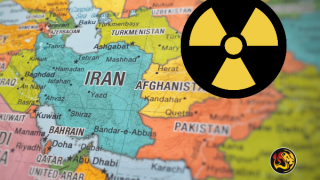
By Stefan J. Bos, Chief International Correspondent Worthy News
TEHRAN (Worthy News) – Iran’s military has launched massive drills aimed at improving its air defenses as Tehran rushes to enrich uranium to near atomic bomb levels, Worthy News monitored Wednesday.
The exercises were underway while the White House reportedly prepared for a potential U.S. attack on Iran’s nuclear facilities if Tehran moves towards a nuclear weapon before January 20, when Donald J. Trump will be inaugurated as America’s 47th president.
American sources with close knowledge about the situation said national security adviser Jake Sullivan presented outgoing U.S. President Joe Biden with options for such strikes in a meeting several weeks ago that remained secret until now
However, the Axios news website, which first reported about possible U.S. military action, commented that a “U.S. strike on Iran’s nuclear program during the lame duck period would be an enormous gamble from a president who promised he would not allow Iran to develop a nuclear weapon.”
It added that such a strike “would also risk handing a fresh conflict over to his successor.” Sources said Biden did not green-light a strike during the meeting and has not done so since, but it was unclear whether Iran’s latest drills, organized near a key nuclear facility, could impact his decision-making process.
Analysts said Iran seeks to project strength following a series of regional military blows by Israel and the election of Trump in the United States.
Iran’s latest drills – dubbed Eqtedar, or “might,” in Farsi – have involved the Islamic Revolutionary Guard Corps (IRGC), the ideological branch of Iran’s military, alongside the army.
FIRST PHASE
“The first phase of the joint Eqtedar exercises in the air defense zone of the Natanz nuclear facility has commenced under the orders of the air defense headquarters commander,” state television confirmed.
It added that IRGC air forces were undertaking “an all-out point defense” of the site “against a multitude of air threats in tough electronic warfare conditions.”
On Monday, IRGC spokesman Ali Mohammad Naini said the drills, which will also cover other parts of Iran until mid-March, were being conducted in response to “new security threats,” without elaborating.
He added that several branches of the IRGC, including the navy and the paramilitary Basij forces, will also participate in the exercises.
At the end of October, Israel attacked key military targets in Iran, degrading its air defense and missile production capabilities in retaliation for a massive ballistic missile attack on Israel earlier that month.
Israel also wants to ensure Tehran, which is sworn to the Jewish state’s destruction, won’t be able to develop nuclear weapons.
Iran maintains that its nuclear program is solely for peaceful purposes and denies any intention to develop atomic weapons.
ENRICHED URANIUM
However, Iran has, in recent years, increased its manufacturing of enriched uranium, and it is the only non-nuclear weapons state to possess uranium enriched to 60 percent, the International Atomic Energy Agency (IAEA) nuclear watchdog said.
That level is well on the way to the 90 percent required for an atomic bomb and beyond anything needed for a civilian nuclear program, experts said.
Tensions over Iran’s nuclear program soared after the United States, during Trump’s first term in office, withdrew from a landmark nuclear deal that offered Tehran sanctions relief in return for curbs on its nuclear ambitions.
And with Iran reportedly being close to developing a nuclear bomb, U.S.-Iranian ties were not expected to improve soon under a Trump presidency.
It was unclear, however, how much of a conventional military threat Tehran could pose for the region following Israel’s recent strikes deep inside Iran.
Israel recently damaged Iran’s missile production capabilities as well as elements of the nuclear program, Prime Minister Benjamin Netanyahu and the Israel Defense Forces (IDF) said.
However, they added that the damage to the nuclear program was not significant enough to thwart it.
MUCH DAMAGE
They did stress, however, that Iran’s ability to produce ballistic missiles and solid fuel, which is used for long-range missiles, was greatly diminished.
The Israeli strikes also reportedly destroyed much of Iran’s air defense system, including its four Russian-made S-300 systems.
Israel’s actions came after Tehran
attacked the Jewish nation in response to Israel’s killings of Hamas leader Ismail Haniyeh in Tehran in July and Hezbollah leader Hassan Nasrallah in September.
The Iranian strikes involved hundreds of ballistic missiles being shot at Israel, triggering sirens across the country.
There were no casualties.
Yet the IDF acknowledged that certain airbases were hit, although the Air Force’s capabilities were reportedly unaffected.
Copyright 1999-2026 Worthy News. This article was originally published on Worthy News and was reproduced with permission.
Latest News from Worthy News
Hungarian Methodist pastor Gábor Iványi told a Budapest court he would rather “accept a prison sentence than admit guilt” in what he considers a politically motivated case ahead of Hungary’s parliamentary elections.
Japan’s first-ever female prime minister was effectively re-elected as her Liberal Democratic Party (LDP) recorded its strongest performance in snap parliamentary elections in the country’s post-war history.
Senior Hamas leader Khaled Mashaal on Sunday reaffirmed the terrorist group’s refusal to disarm, rejecting demands from U.S. President Donald Trump and vowing to continue the fight against Israel.
The U.S. government added $696 billion to the national debt over the past four months, borrowing $94 billion in the month of January alone, the Congressional Budget Office reports.
Anti-ICE protests continued in Minneapolis over the weekend, resulting in dozens of arrests by local law enforcement.
Authorities across North Africa and southern Europe remained on high alert Monday after powerful storms killed numerous people and forced the evacuation of more than 160,000 residents.
Ukraine’s foreign minister has warned that intensified Russian attacks on his country’s energy infrastructure are creating a direct risk of a nuclear incident that could affect all of Europe.







